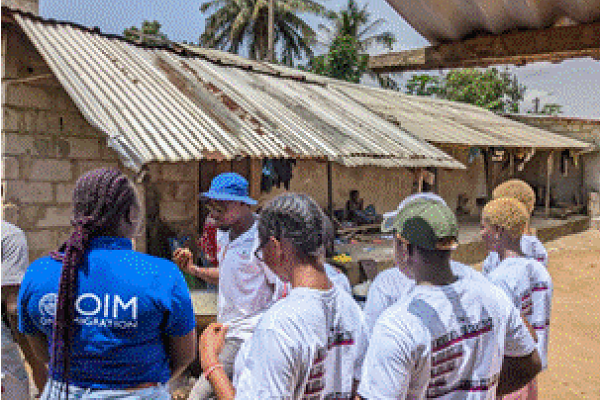Repository of Practices

Mental Health and Empowerment at the Forefront of the Assistance Provided to Victims of Trafficking
Secondary GCM Objectives
Dates
Summary
With the overall objective of strengthening institutional capacities and operational mechanisms to fight against human trafficking and migrant smuggling in Côte d’Ivoire, this Italian Ministry of Foreign Affairs-funded project provides direct assistance to Victims of Trafficking (VoT) and smuggled migrants identified in Côte d’Ivoire. More specifically, it provides migrants who are victims of trafficking, abuse and exploitation with access to voluntary return and reintegration assistance in their countries of origin. The specific practice is intended for foreign victims identified in Côte d'Ivoire, who receive holistic and multidimensional assistance, particularly prior to their return. Before being able to return to their country of origin, VoTs spend several weeks in transit centers due to the long pre-departure administrative procedures (coordination with consulates for travel documents, medical examinations, fit-to-travel, etc.). The lengthy wait time is often a source of stress and distress for VoTs, who have often experienced traumatic experiences as a result of their migration journey and the exploitation suffered.
Therefore, in order to promote their well-being, mental health and strengthen their resilience, skills training and psychological follow-up are offered to VoTs hosted in partner centers, through the use of art therapy, resilience coaching, motor and sensory activities, emotional awareness and stress management activities, role playing games, breathing and medication exercises, etc. In addition, skills trainings such as hairdressing, sewing, pastry, agriculture, etc. are also provided to VoTs in order to gain new skills and contribute to their personal development prior to their return and the implementation of their reintegration project in their country of origin. Finally, recreational trips outside of the centers are also organized to contribute to their mental well-being.
Following some of the challenges faced, an agreement with the National Mental Health Plan is underway in order for social workers and specialized personnel to provide adequate services within centers on a continuous basis as well as reinforce the skills of existing center personnel to ensure sustainability of the initiative. In addition, the National Committee for the Fight Against Trafficking (CNLTP), which regularly refers VoTs to IOM for assistance, have started to conduct joint monitoring visits with IOM to the various centers to follow-up on the different assisted cases.
Organizations
Main Implementing Organization(s)
Benefit and Impact
Based on questionnaires administered after beneficiaries' stays in various transit centers, and quotes from VoTs during MHPSS sessions, including focus group discussions, the majority reported feeling "ready to return home" and stated that the MHPSS sessions "increased their courage." Some mentioned that their "migration journey was destructive on all levels, but the MHPSS sessions made them more resilient." One beneficiary noted that their "migration experience became constructive once the exploitation ended, thanks to the supportive environment at the transit center, creative workshops, personal development activities, and listening sessions." Regarding the new skills acquired at the transit centers, VoTs often apply them upon returning to their country of origin to establish income-generating activities. Alternatively, they may use the reintegration assistance to pursue professional training, further refining the skills they previously gained in Côte d’Ivoire.
Key Lessons
Recommendations(if the practice is to be replicated)
Innovation
The human rights approach in providing MHPSS and art therapy to victims of trafficking is centered around several core principles, including non-discrimination, guaranteeing that all victims, regardless of their gender, nationality, ethnicity, religion, or any other status, have equal access to MHPSS and art therapy services; dignity and respect, ensuring that all interventions are carried out in the respect of victims, treating them with compassion, empathy, and understanding, acknowledging their past trauma, and supporting their journey towards healing. Victims are also encouraged to actively participle in their own recovery process. This includes involving them in the decision-making about the types of activities they want to be part of, the experiences they wish to share and the suggestions they share about future activities to be implemented in the centers. Finally, the practice ensures the confidentiality and safety principle, protecting the privacy of victims and providing them with a safe environment to express themselves freely.
All of the services provided to VoTs by IOM are gender-focused and based on the specific needs of each of the beneficiaries. Gender is considered during the interview of the beneficiaries by favoring women for interviews of women and girls or choosing female gynecologists for women to respond to the international principles of assistance to VoTs. Moreover, in the elaboration of the material kits, IOM made sure to provide kits that corresponded to the needs of men and women, and girls and boys. Gender is also considered during the assisted voluntary return process that VoTs also benefit from, and in this regard female operational escorts assist girls with voluntary return.
Additional Resources
Additional Images
Date submitted:
Disclaimer: The content of this practice reflects the views of the implementers and does not necessarily reflect the views of the United Nations, the United Nations Network on Migration, and its members.
More Related Practices:
- IOM’s Regional Programme Strengthens the Protection of Child Victims across North Africa and Key Routes
- Mental Health and Empowerment at the Forefront of the Assistance Provided to Victims of Trafficking
- Search and Rescue (SAR) missions for stranded migrants in Niger
- Fortalecimiento de la protección y seguridad fronterizas en Haití por medio del reforzamiento de la Policía Fronteriza Terrestre (POLIFRONT)
- Proyecto de carnetización de trabajadores de temporada, transfronterizos y tránsito vecinal fronterizo en El Amatillo, El Salvador
Peer Reviewer Feedback:
*References to Kosovo shall be understood to be in the context of United Nations Security Council resolution 1244 (1999).
Newsletter
Subscribe to our newsletter.

